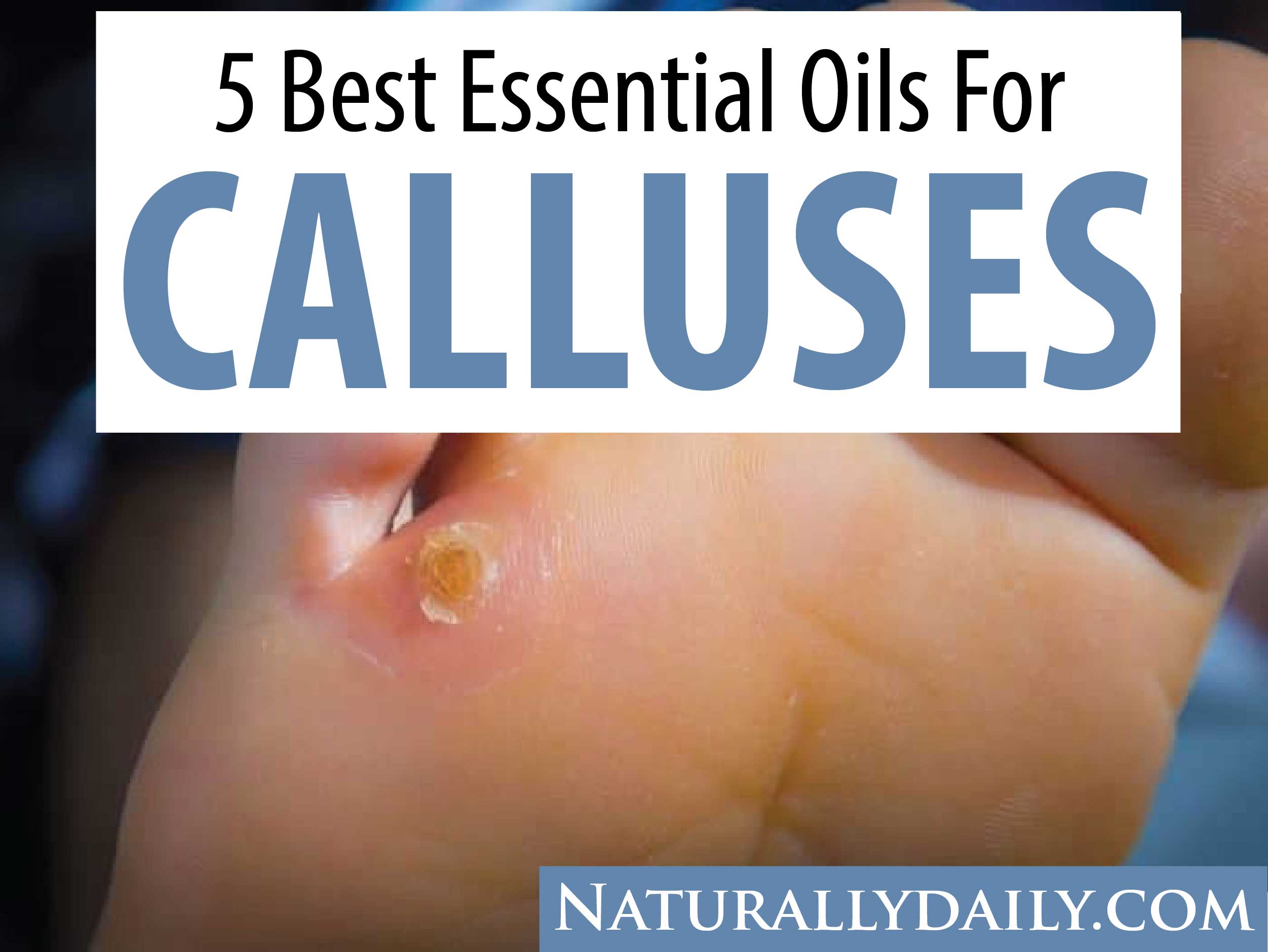Morton’s neuroma (MN) is the thickening, inflammation, or enlargement of the nerve between the bones of your toes. It is a painful condition that mostly affects middle-aged women, although people of any age can get affected. [1]
Morton’s neuroma occurs when the tissue inside your foot gets thicker next to the nerve, which leads to a toe.
You may feel pain and swelling while walking like there’s a little marble or a bunched-up sock under the ball of the foot. The pain may hamper the quality of your life, so you need to get rid of it as soon as possible.
You must go for surgery if the condition doesn’t improve with medications. While surgery is usually effective, it can cause permanent numbness in your toes.
Some essential oils are rich in anti-inflammatory and analgesic properties that may help reduce pain and inflammation. You can try some of these therapeutic oils to reduce pain while you’re on treatment for MN.
Continue reading to learn about some effective essential oils for Morton’s neuroma to relieve some symptoms.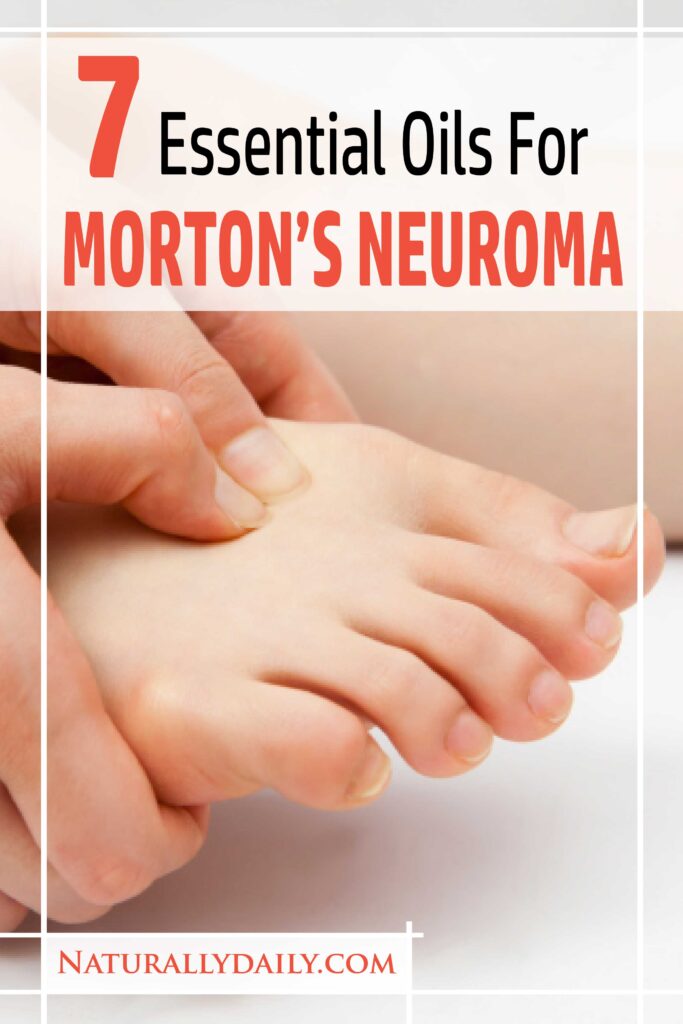
Some Pain Relieving Essential Oils for Morton’s Neuroma
1. Lavender Oil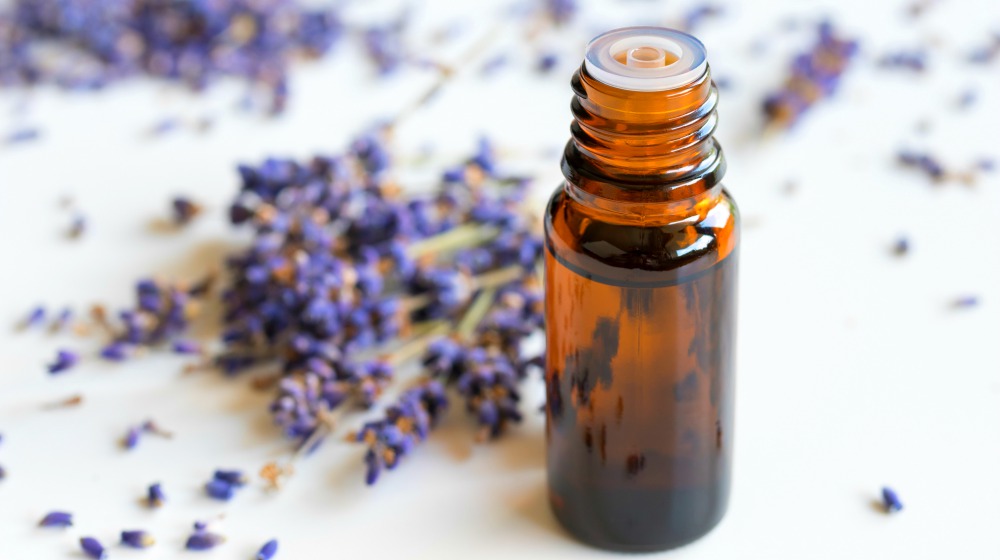
Lavender oil is a popular choice when it comes to relieving pain. This oil contains a long list of therapeutic components that help soothe many ailments. [2]
Lavender essential oil is rich in anti-inflammatory and analgesic properties, which may soothe the pain and inflammation of MN. [3]
Due to its antidepressant effects, lavender oil can help reduce the damaging effects of stress on the body. In addition, its mild sedative activities can be helpful if you have trouble sleeping due to pain.
2. Marjoram Oil
Known as a natural painkiller, marjoram oil can be a great option if you’re suffering from Morton’s neuroma.
This warm and spicy flavored essential oil originates from the marjoram (Origanum majorana) plant, a vital ingredient in beer production before the introduction of hops.
Marjoram essential oil is rich in anti-inflammatory, analgesic, antioxidant, anti-convulsing, antibacterial, and immune-stimulant properties. [4]
This essential oil can be an effective pain reliever for the conditions like bunions, tendonitis, Morton’s neuroma, etc. In addition, its sedative effect can help calm your mind while soothing pain and inflammation.
3. Rosemary Oil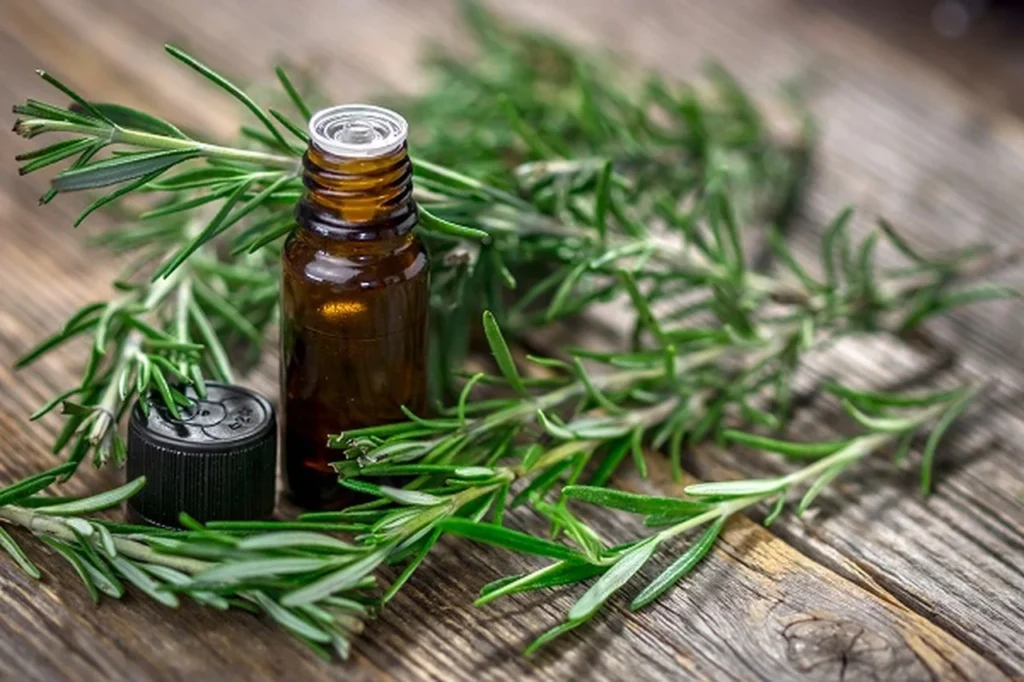
Rosemary essential oil is derived from Rosmarinus officinalis, an evergreen shrub with needle-like leaves.
This therapeutic oil contains many anti-inflammatory, analgesic, anti-anxiety, and immune-stimulant components. Hence, it can soothe several conditions associated with pain and inflammation.
A 2015 animal study states that rosemary oil can be a mild pain reliever. It also determined that this therapeutic oil is more effective than acetaminophen, an over-the-counter painkiller. [5]
Besides, this essential oil can reduce tissue inflammation, eventually leading to pain, swelling, and stiffness. [6]
4. Peppermint Oil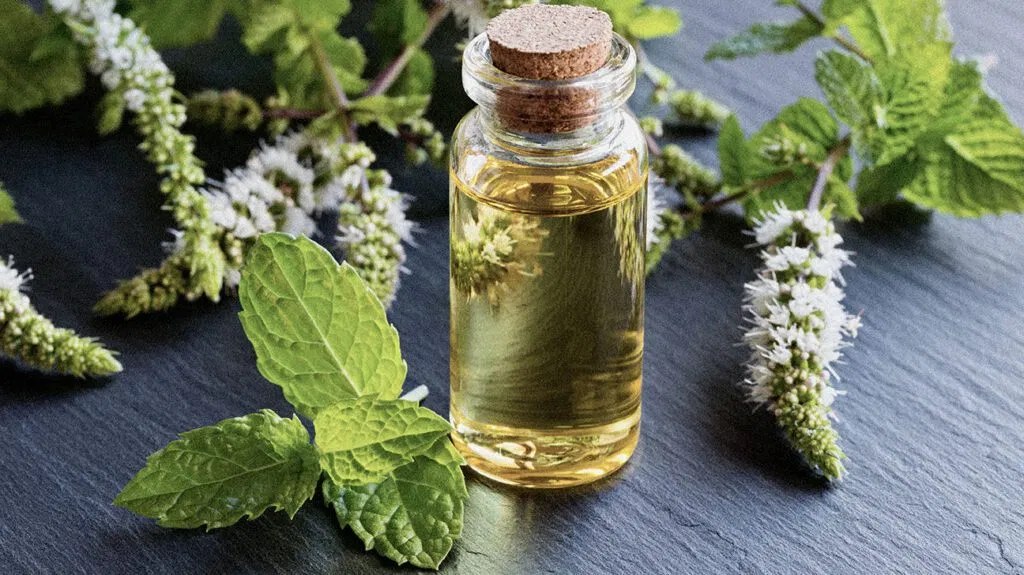
Peppermint essential oil is quite popular for its revitalizing aroma. Obtained from the flower tops of the peppermint plant, this herbal oil is widely used as a remedy for joint pain, muscle pain, and swelling. [7]
Peppermint oil’s anti-inflammatory and antispasmodic compounds help ease aches and inflammation. [8]
Due to its high menthol content, this oil has a cooling effect on the affected area when applied topically.
5. Ylang-Ylang Oil
This therapeutic essential oil comes from the fresh flowers of Cananga odorata, a tree commonly found in tropical Asia.
Ylang-ylang essential oil contains anti-inflammatory, antidepressant, antiseptic, and antimicrobial properties that help treat many ailments. [9]
While reducing the pain, its healing properties can also help repair the damaged nerve. The oil also contains soothing components that can help you relax while you’re in pain.
6. Helichrysum Oil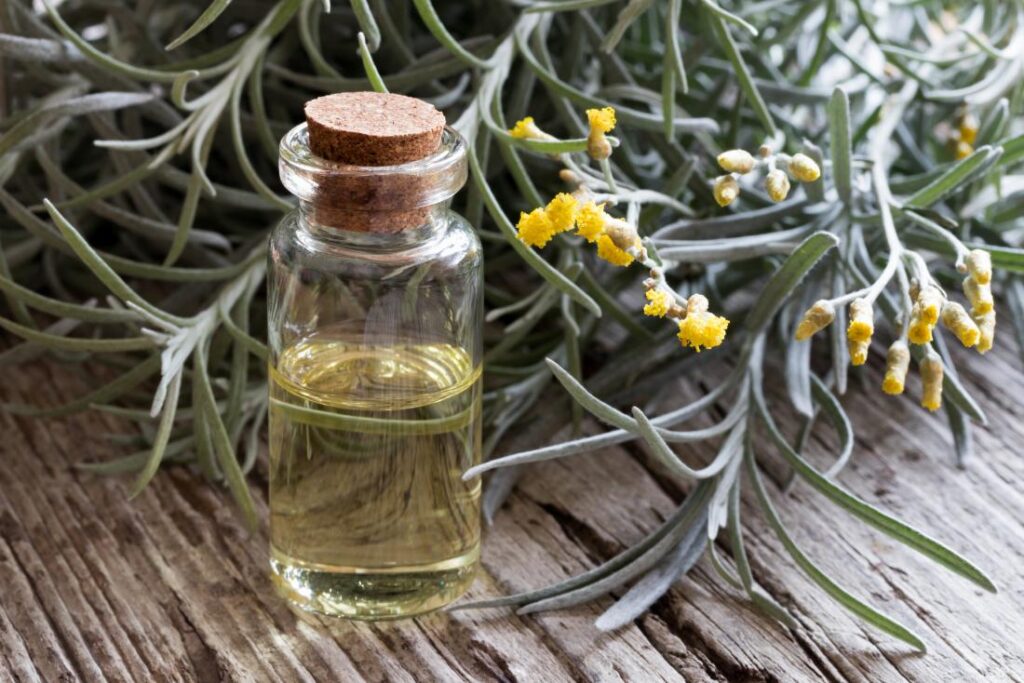
Helichrysum essential oil originates from the Helichrysum italicum plant through steam distillation.
The oil has been traditionally used as a medicine because of its antifungal, anti-inflammatory, and antibacterial properties.
Research published in 2016 confirms the anti-inflammatory effects of helichrysum oil. [10]
Its therapeutic properties help this oil to heal and regenerate damaged nerves while reducing pain.
7. Eucalyptus Oil
Eucalyptus essential oil is extracted from the sickle-shaped leaves of the eucalyptus tree. Loaded with therapeutic components, this oil is a traditional remedy for cold, fever, flu, muscle pain, and joint pain. [11]
A randomized clinical trial shows that inhaling the vapor of eucalyptus oil could reduce the pain, inflammation, and swelling in patients who underwent total knee replacement surgery. [12]
The oil contains antispasmodic, anti-inflammatory, and analgesic compounds, making it a popular choice for treating nerve pain.
How to Use Essential Oils for Morton’s Neuroma
Foot Massage:
Please dilute a few drops of essential oil with a suitable carrier oil. Then, gently massage your affected area. Repeat this process until you feel better.
Foot Bath:
Add a few drops of the above-mentioned essential oils to a bowl of lukewarm water. Soak your feet into that solution for 15-20 minutes.
Inhalation:
You can also inhale the essential oils from a diffuser. It will reduce inflammation and calm your mind.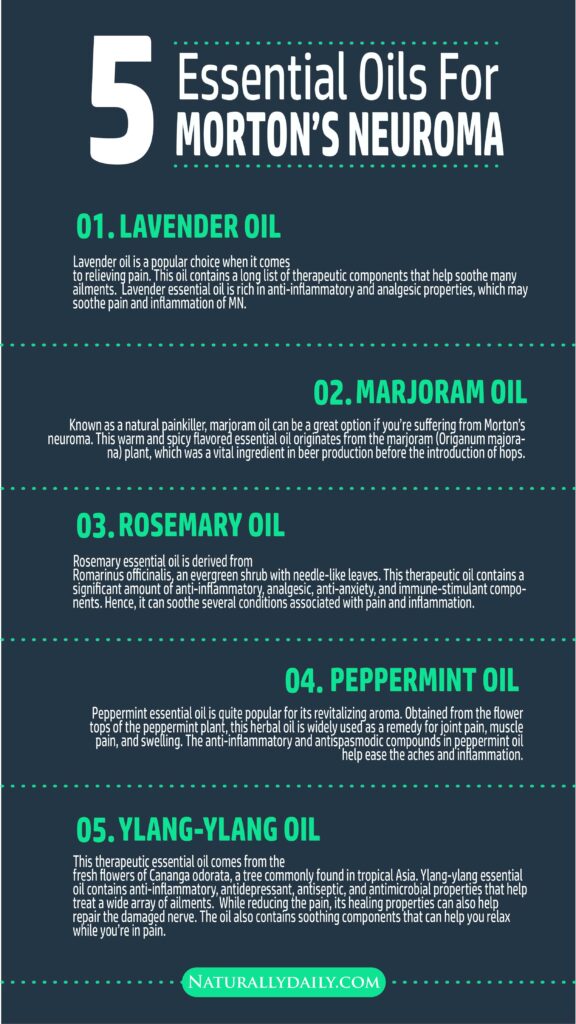
Some Safety Tips for Using Essential Oils
- To find out whether the particular essential oil suits you or not, conduct a patch test.
- Read the instruction on the bottle before you start using any essential oil.
- Always remember to dilute the essential oils for topical application.
- If you have any allergic reaction after using any particular oil, stop using it immediately.
- Pregnant women and breastfeeding moms should always consult with a doctor before they use any essential oils. Although these oils are safe, there are not enough studies that prove their safety during pregnancy.
Prevention Tips for Morton’s Neuroma
- Always wear shoes that are wide enough at the toe. Do not wear high heels or tight shoes for longer periods.
- Do regular stretching.
- Consider wearing athletic shoes when you’re running or playing sports.
Does Morton’s Neuroma Require Doctor?
Usually, symptoms of Morton’s neuroma go away after you change your shoes to a comfortable one. However, if the pain lasts longer than a few days, you need to consult with a doctor.
You should also ask for medical attention if you still have pain after changing the shoes. Your doctor will make a proper diagnosis and prescribe medications. They may also conduct surgery if the condition becomes severe.
End Note
Certain sports and foot deformities can cause Morton’s neuroma, making it important to take precautions like wearing comfortable shoes.
Older women are most likely to suffer from this disease due to the frequent use of high heels. However, men can also get affected by this painful condition.
While some physical therapies and essential oils can help reduce pain and inflammation, they should always be considered complementary remedies.
Do not forget to consult a doctor if the pain worsens and you have difficulty walking. Routine stretches and exercises under the proper guidance of a physical therapist can be a good option to strengthen your ankles and legs.






